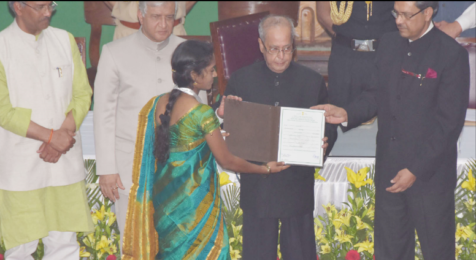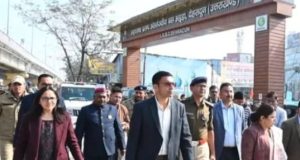Convocation of 2015-17 IFS (Probationer) Course at IGNFA, Dehradun was held in presence of chief guest President of India Pranab Mukherjee while Governor Dr. KK Paul and Chief Minister Trivendra Singh Rawat were also present as special guest there today.
President Mukherjee extended congratulations to the trainees. He said that training imparted to young probationers will help to prepare them to face the future challenges. He emphasized on the coordination between conservation and development and expressed satisfaction that forest covered increased compared to 30 years ago. Forest cover must be 30 percent, President Shri Pranabh Mukherjee underlined.
President said that challenges of poverty and hunger might be faced through conservation of natural resources and firm commitment towards environment conservation along with keeping common man on the focus point of development process. He suggested the officials to link the environment conservation with poverty elimination process. He emphasized that being young professionals, officials have to be capable to take decisions considering long term impact on the environment. He suggested to use scientific methods for natural resources management. As conservation of natural resources would ensure the eco system protection. He expressed hope that young officials would maintain the high professional standards.
While extending greetings Uttarakhand Governor said that it is interesting to note that the history of forestry in India has had its beginnings in this region, and even now, all forest officers receive their training in the Doon valley, which can be called the “cradle of Indian Forestry”. At the same time, this Himalayan region is the home of the Chipko movement of conservation, that is regarded as an ideal in the environmental conservation movements of the world. The pride that this gives to this hill region is immense. And yet, we are faced with several aspects, related to our forests and environment which need to be dealt with, so that the state can benefit from its rich biodiversity. The fragile ecology of Uttarakhand has always kept the region under a threat of natural disasters.
He further added that foresters today are expected to give more intensive technological and socio-economic inputs than were given by the foresters in the past. The paradigm shift from the maximization of government revenue from the forest, to the conversion of this natural resource, for providing various goods and services to the society, consistent with environmental conservation, demands radical changes in the approach for planning the management of Forests. The importance of the forests in control of natural disasters like floods, draught and loss of soil productivity, along with their importance in providing goods and services to the society has resulted in growing public interest in conservation of forest resources. People ask for more information about these resources and look forward to greater change for participation in decision making and management processes. The forester is, therefore, expected to share his knowledge with our society. The forester also needs not only stronger infrastructural support but also involvement in dissemination of scientific knowledge and wider range of technological skills to the local people. Yet, despite the growing awareness and numerous benefits of stopping deforestation, more than thirteen million hectares of forests are cleared around the world each year. This deforestation accounts for a very significant percentage of global greenhouse gas emissions, and it is threatening the future of our planet. Part of the problem arises from the fact that we do not have a system of ‘green accounting’. Economists estimate GDP, which is gross domestic product, as a broad measure of national income, and also estimate NDP or net domestic product, which accounts for the use of physical capital. But as yet, we have no generally accepted system to convert Gross Domestic Product, into Green Domestic Product that would reflect the use of precious natural resources in the process of generating national income. It is hoped, a better clarity on the concept of Green Domestic Product would sensitise the stake holders more appropriately. This is particularly relevant in case of Uttarakhand having over 60% area under forest cover.
Uttarakhand Chief Minister Shri Trivendra Singh Rawat also congratulated the probationers and stated that scientific management of forests in our country is among the oldest system of world and you are going to be part of this historical achievement from today. He said that future is bound to adopt new concepts, renewable energy resources, conserve natural environment and traditional culture. He emphasized on bio-diversity conservation and inclusive development.
 Dainik Nation News Portal
Dainik Nation News Portal




